Buy Dapsone (Diaminodiphenyl Sulfone) Online from Trusted UK Pharmacy
| Package | Dosage | Price | Price per Dose | |
|---|---|---|---|---|
| Dosage: 100mg | ||||
| 1000 pill | 100mg | £65.84 | £0.06 | |

Dapsone Description
Overview of Dapsone
Dapsone is a medication primarily used for its antimicrobial and anti-inflammatory properties. It belongs to a class of drugs known as sulfone antibiotics. Traditionally, it has been prescribed for the treatment of infections such as leprosy and dermatitis herpetiformis. Its effectiveness in managing these conditions has made it a staple in certain medical protocols. Today, Dapsone is available through online pharmacies, providing convenient access to patients who need it for various indications. As with any medication, understanding its uses, potential side effects, and precautions is essential for safe and effective treatment.
How Dapsone Works
Dapsone works by inhibiting bacterial synthesis of dihydrofolic acid, which is essential for bacterial growth and replication. Its action interferes with some enzymes involved in folate synthesis, ultimately preventing the proliferation of susceptible bacteria. Additionally, Dapsone exhibits anti-inflammatory effects, which makes it useful in treating certain skin conditions. When prescribed for dermatitis herpetiformis, it helps reduce the severity and frequency of skin outbreaks. Its dual antimicrobial and anti-inflammatory actions make it a versatile drug for specific medical conditions.
Common Uses of Dapsone
The most common indication for Dapsone is the treatment of leprosy, especially in multidrug therapy regimens. It is often used in combination with other antibiotics to improve treatment outcomes. In dermatology, Dapsone is prescribed primarily for dermatitis herpetiformis, a chronic blistering skin condition linked to gluten sensitivity. It is also occasionally used for other skin disorders, including certain types of vasculitis and dermatitis that respond to its anti-inflammatory properties. As an oral medication, it is generally chosen when topical therapies are insufficient or impractical.
Potential Side Effects
While Dapsone is effective, it can cause side effects in some patients. Common adverse reactions include nausea, headache, and dizziness. More serious, but less common, effects involve blood disorders such as hemolytic anemia, which may be more likely in individuals with a deficiency of the enzyme glucose-6-phosphate dehydrogenase (G6PD). Monitoring blood counts during therapy is often recommended. Other potential side effects include rash, fever, and liver enzyme elevation. Patients should report any unusual symptoms to their healthcare provider promptly to prevent complications.
Precautions and Interactions
It is important to inform your healthcare provider about your medical history before starting Dapsone, especially if you have G6PD deficiency, liver problems, or blood disorders. Regular blood tests are typically part of the treatment plan to monitor for adverse effects. Dapsone may interact with other medications, such as antimalarials and certain antibiotics, potentially increasing the risk of side effects. Pregnant or breastfeeding women should consult their doctor before using Dapsone, as safety data is limited. Proper dosing and adherence to medical advice can help minimize risks associated with this medication.
Availability and How to Use
Online pharmacies provide Dapsone in various forms, including tablets. The dosage and duration of treatment depend on the specific condition being treated and individual patient factors. It is essential to follow the prescribed instructions carefully. Never modify the dose or stop the medication without consulting your healthcare provider. To ensure safety, purchase Dapsone from reputable online sources that provide quality assurance and proper medication review. This approach helps mitigate the risk of counterfeit or substandard products.